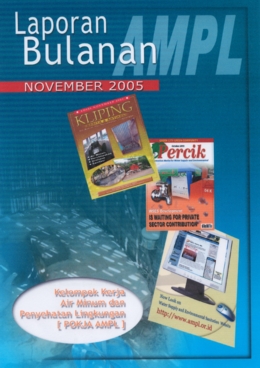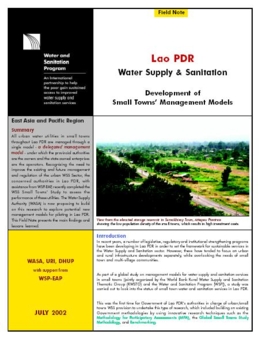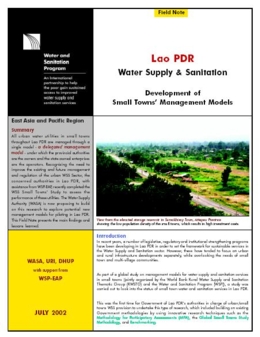Laporan/Prosiding

Laporan Bulanan Kelompok Kerja Air Minum dan Penyehatan Lingkungan (Pokja AMPL) - November 2005
Pokja AMPL
Th.
1.051
Laporan ini merupakan laporan bulanan kegiatan Kelompok Kerja Air Minum dan Penyehatan Lingkungan (Pokja AMPL) yang berisi garis besar hasil kegiatan, serta temuan penting dari kegiatan Pokja AMPL selama bulan November 2005. Selain itu, laporan ini juga memberikan informasi mengenai rencana kegiatan yang akan dilaksanakan pada bulan yang akan datang.
Daftar Isi:
Daftar isi
Daftar Lampiran
A. Sekretariat Pokja AMPL
I. Administrasi
II. Pusat Informasi AMPL
III. Produk Komunikasi Pokja AMPL
B. Kelompok Kerja AMPL
1. Ditjen Bangda, Departemen Dalam Negeri
2. Direktorat Jenderal PP-PL, Departemen Kesehatan
3. Direktorat Pemberdayaan Masyarakat Desa, Departemen Dalam Negeri
4. Direktorat Penyehatan Lingkungan dan Permukiman, Ditjen Cipta Karya
Departemen Pekerjaan Umum
C. Rencana Kegiatan Bulan Desember 2005
Daftar Isi:
Daftar isi
Daftar Lampiran
A. Sekretariat Pokja AMPL
I. Administrasi
II. Pusat Informasi AMPL
III. Produk Komunikasi Pokja AMPL
B. Kelompok Kerja AMPL
1. Ditjen Bangda, Departemen Dalam Negeri
2. Direktorat Jenderal PP-PL, Departemen Kesehatan
3. Direktorat Pemberdayaan Masyarakat Desa, Departemen Dalam Negeri
4. Direktorat Penyehatan Lingkungan dan Permukiman, Ditjen Cipta Karya
Departemen Pekerjaan Umum
C. Rencana Kegiatan Bulan Desember 2005

Tapping the Market: Private Sector Engagement in Rural Water Supply in the Mekong Region
WSP - East Asia and the Pasific
4 Th.
915
The growing number of small-scale private enterprises providing water to villagers throughout Vietnam and Cambodia demonstrates the critical role the local private sector is playing in supplying water to the region.
This field note outlines the key features of this expanding private sector and provides lessons for other countries seeking to develop alternatives approaches to rural water supply.
This field note outlines the key features of this expanding private sector and provides lessons for other countries seeking to develop alternatives approaches to rural water supply.



Component-Sharing
Up-Scaling Demand-Responsive Approaches in Rural Water Supply and Sanitation Sector in Pakistan
WSP
Th.
932
Water and Sanitation Program-South Asia (WSP-SA), in partnership with Government of Pakistan (GoP) agencies, has been working to implement the Rio/ Dublin Principles in the Rural Water Supply and Sanitation (RWSS) sector in the country. Notable progress has been made, although considerable challenges remain. The overarching objectives of RWSS development activities continue to be improving access to, quality of, and gender and spatial equity in, delivery of services. In order to achieve these objectives, adoption of community-driven and demand-responsive implementation arrangements, leads to substantial savings in capital and recurrent project costs and also strengthens sustainablity. Component-sharing is a very effective strategy to implement Demand-Responsive Approaches (DRAs).
This field note presents three models of component-sharing with differing elements necessitated by the specific environment of each model:
- Local Government and Rural Development Department's (LG & RDD) water supply schemes in Azad Jammu and Kashmir.
- Sanitation schemes in Lodhran district of the Punjab being implemented by Lodhran Pilot Project (LPP)
- The erstwhile Public Health Engineering Department's (PHED) pilot water supply schemes in Sindh.
This field note presents three models of component-sharing with differing elements necessitated by the specific environment of each model:
- Local Government and Rural Development Department's (LG & RDD) water supply schemes in Azad Jammu and Kashmir.
- Sanitation schemes in Lodhran district of the Punjab being implemented by Lodhran Pilot Project (LPP)
- The erstwhile Public Health Engineering Department's (PHED) pilot water supply schemes in Sindh.

Lao PDR Water Supply & Sanitation - Development of Small Towns Management Models
22 Juli 2005
923
Lao PDR Water Supply & Sanitation
Development of Small Towns Management Models
WASA, DHUP, URI
WSP-EAP, Juli 2002
lihat selengkapnya
Development of Small Towns Management Models
WASA, DHUP, URI
WSP-EAP, Juli 2002
lihat selengkapnya

Lao PDR Water Supply and Sanitation: Development of Small Towns' Management Models
Th.
983
All urban utilities in small towns throughout Lao PDR are managed through a single model - a delegated management model - under which the provincial authorities are the owners and the state-owned enterprises are the operators. Recognizing the need to improve the existing and future management and regulation of the urban WSS Sector, the concerned authorities in Lao PDR, with assistance from WSP-EAP, recently completed the WSS Small Towns' Study to assess the performance of these utilities. The Water Supply Authority (WASA) is now proposing to build on this research to explore potential new management models for piloting in Lao PDR.
This field note presents the main findings and lessons learned.
This field note presents the main findings and lessons learned.
